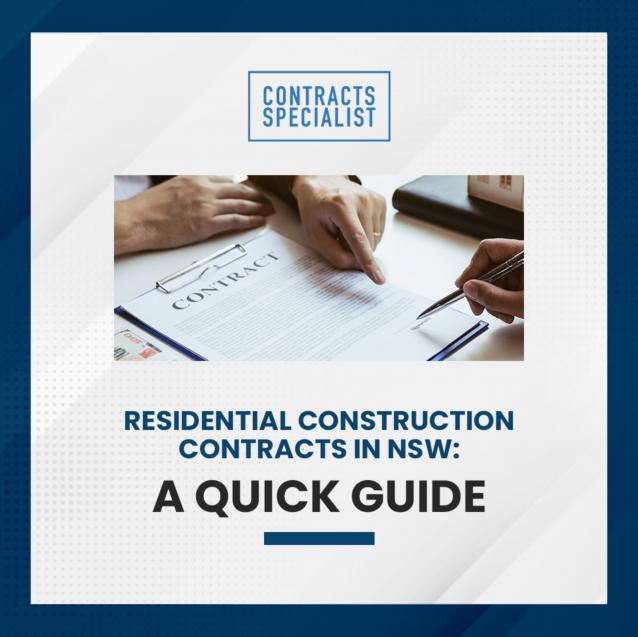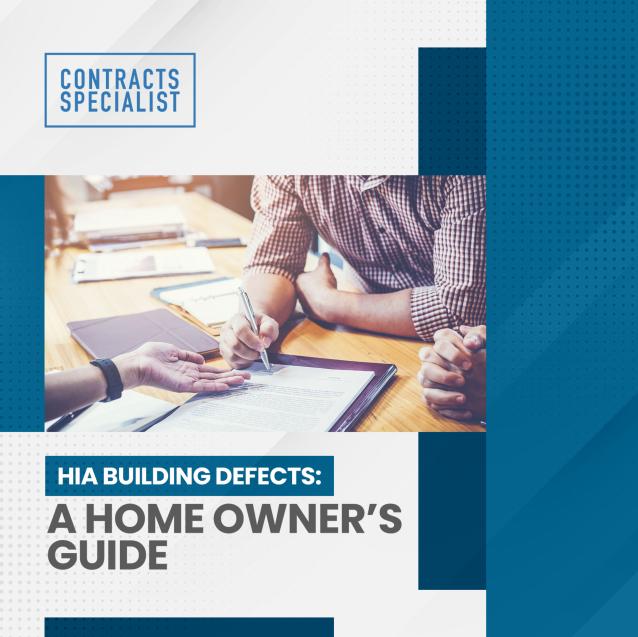
Master Builders NSW BC4 Contract: 10 Terms Home Owners Must Negotiate
By Contracts Specialist|January 18, 2023
Building a home may be the biggest investment of your life. Before you sign that Master Builders BC4 Contract, here are 10 things you must consider.
Essential Risks
For most Home Owners, the most important things are Cost, Time, and Quality.
These are known as the “Essential Risks” to every building contract. It’s important to know how to minimise these risks before the start of your project, and you can do this by looking at the terms of the contract that affect cost, time, and quality.
What is a Master Builders NSW BC4 Contract?
A Master Builders BC4 contract is a residential building contract prepared and issued by the Master Builders Association in NSW. As such, they’re generally written to favour the Builder more than the Home Owner, hence, you should take that extra step of going through the contract’s terms thoroughly, and propose amendments as necessary.
But first: Contractor Licence
Before going through the contract’s terms, double check to make sure that your Builder or Contractor is licenced. You can verify the contractor’s licence through the NSW government’s service website.
And now, the 10 contract terms you need to know:
1) Commencement of Work
2) Time for Completion
3) Extension of Time
4) Practical Completion
5) Progress Payments
6) Variations
7) Defects Rectification
8) Suspension of the Works
9) Termination of the Contract
10) Dispute Resolution Procedure
Essential Risks
For most Home Owners, the most important things are Cost, Time, and Quality.
These are known as the “Essential Risks” to every building contract. It’s important to know how to minimise these risks before the start of your project, and you can do this by looking at the terms of the contract that affect cost, time, and quality.
What is a Master Builders NSW BC4 Contract?
A Master Builders BC4 contract is a residential building contract prepared and issued by the Master Builders Association in NSW. As such, they’re generally written to favour the Builder more than the Home Owner, hence, you should take that extra step of going through the contract’s terms thoroughly, and propose amendments as necessary.
But first: Contractor Licence
Before going through the contract’s terms, double check to make sure that your Builder or Contractor is licenced. You can verify the contractor’s licence through the NSW government’s service website.
And now, the 10 contract terms you need to know:
1) Commencement of Work
- What it does: Sets out the commencement date of the building works
- Why it’s important: This affects other matters like payment and completion
- Essential risks minimised:
- Time
- Cost
2) Time for Completion
- What it does: Sets out the building period
- Why it’s important: This affects the parties’ other contractual rights & liabilities relating to extension of time, liquidated damages, etc.
- Essential risks minimised:
- Time
- Cost
3) Extension of Time
- What it does: Lays out the procedure for Builder/tradesperson to claim extension of time
- Why it’s important: To safeguard against invalid claims for extension of time
- Essential risks minimised:
- Time
- Cost
4) Practical Completion
- What it does: Lays out when, how, and in what instances the Builder/Contractor can claim that the works have reached practical completion
- Why it’s important: It allows you to claim incomplete works/defects, on the other hand
- Essential risks minimised:
- Time
- Cost
- Quality
5) Progress Payments
- What it does: Lays out the procedure for Builder to claim payment from you, based on the stages of work and the payment terms
- Why it’s important: Allows you to dispute the value and quality of work
- Essential risks minimised:
- Time
- Cost
- Quality
6) Variations
- What it does: Lays out the procedure for Builder to claim payment from you, based on the stages of work and the payment terms
- Why it’s important: Allows you to dispute the value and quality of work
- Essential risks minimised:
- Time
- Cost
- Quality
7) Defects Rectification
- What it does: Lays out the procedure for rectification of defects
- Why it’s important: It sets out your right to demand rectification in case of defects
- Essential risks minimised:
- Time
- Cost
- Quality
8) Suspension of the Works
- What it does: Lays out the instances when the works may be suspended, and the procedure to be employed in case suspension is warranted
- Why it’s important: So you’ll know whether or not a suspension of works is justified or properly imposed
- Essential risks minimised:
- Time
- Cost
9) Termination of the Contract
- What it does: Lays out the grounds and procedure for each party to terminate the contract
- Why it’s important: So you know when and how to terminate the contract in case of breach, or other allowable causes
- Essential risks minimised:
- Time
- Cost
- Quality
10) Dispute Resolution Procedure
- What it does: Lays out the procedure for settling building disputes
- Why it’s important: This is an easier, quicker, and cheaper remedy than filing a case in court
- Essential risks minimised:
- Time



